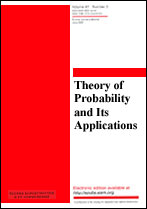|
This article is cited in 3 scientific papers (total in 3 papers)
On some testing of hypothesis problems with information constraints
M. V. Burnasheva, Shun-ichi Amarib, T. S. Hanc
a A. A. Kharkevich Institute for Information Transmission Problems, Russian Academy of Sciences
b RIKEN Brain Science Institute, Japan
c Graduate School of Information Systems, University of Electro-Communications, Japan
Abstract:
A problem of hypothesis testing is considered where some part of the data cannot be directly observed. Our helper observes those data and can send us some limited amount of information about them. What kind of information allows us to make the best statistical inferences? In particular, what is the minimal information sufficient in order to get the same results as if we could directly observe all the data? Some upper bounds for that minimal amount of information and some related results are obtained. A problem of hypothesis testing is considered where some part of the data cannot be directlyobserved. Our helper observes those data and can send us some limited amount of information about them. What kind of information allows us to make the best statistical inferences? In particular, what is the minimal information sufficient in order to get the same results as if we could directly observe all the data? Some upper bounds for that minimal amount of information and some related results are obtained.
Keywords:
hypothesis testing, error probability, rate of transmission, critical rate.
Received: 07.09.1998
Citation:
M. V. Burnashev, Shun-ichi Amari, T. S. Han, “On some testing of hypothesis problems with information constraints”, Teor. Veroyatnost. i Primenen., 45:4 (2000), 625–638; Theory Probab. Appl., 45:4 (2001), 558–568
Linking options:
https://www.mathnet.ru/eng/tvp495https://doi.org/10.4213/tvp495 https://www.mathnet.ru/eng/tvp/v45/i4/p625
|


|




 Contact us:
Contact us: Terms of Use
Terms of Use
 Registration to the website
Registration to the website Logotypes
Logotypes







 Citation in format
Citation in format 
